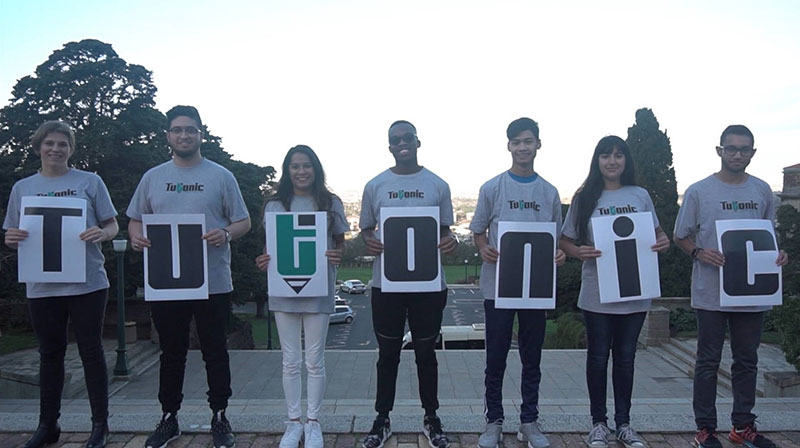Maths help for matrics, thanks to student tutors
27 May 2020 | Story Helen Swingler. Read time 6 min.
When University of Cape Town (UCT) student Ilyaas Amien started his maths tutoring service in 2017, he could never have imagined a time like this. COVID-19 has turned schooling upside down, leaving matrics especially vulnerable – and especially vulnerable in a pivotal subject like maths.
Amien is a medical student at UCT, having recently returned to the MBChB programme after completing an honours degree in neuroscience. He hopes to tackle a concurrent master’s programme in neuroscience in 2021.
“My goal is to one day become a clinician scientist who connects the brain to the bedside,” he said.
When Amien started Tutonic, a free, online maths tuition service, he had one aim: to support high school students around the country and bridge the gap between access and quality education.
“I wanted a platform to address the chronic lack of maths support for high school students.”

Tutonic began with 50 students and now has 500 (a huge jump from last year’s 300 students), and 15 student tutors; most are from UCT and all are volunteers. The organisation is endorsed by the Western Cape Education Department.
High anxiety
“Some of our pupils attend schools that have continued their academic project during lockdown; others have had absolutely no teaching time.”
Anxiety and uncertainty are high, especially among matrics.
“Many students also have data issues, which make it difficult to access Tutonic at times. However, I get the impression that most students feel more at ease, given the resources that Tutonic provides.”
Resources include concept videos that cover all the maths content from grades 8 to 12, quizzes and previous questions Tutonic has received from other pupils over the years, personalised support from a university student (pupils can submit questions they’re struggling with), and weekly live sessions with a tutor for matrics.
“We also encourage teachers to use these as a teaching tool, to ‘flip the classroom’.”
“Tutonic has created over 1 000 maths videos (concept videos and tutor responses), now curated in the Tutonic Bank,” said Amien. “We also encourage teachers to use these as a teaching tool, to ‘flip the classroom’. Our aim is to make the teaching experience less didactic and more engaging.”
This year Tutonic introduced live sessions where pupils can engage with a tutor via Zoom once a week. Pupils can also ask specific questions via the site and get quick answers from tutors. They have also formed a group for maths teachers to connect and share resources.
Lifeline for matrics
The organisation has been a lifeline for many struggling matrics.
Rita Alfonso, a matriculant at Holy Cross High School in the Western Cape, said the lockdown had been hard as a learner struggling with maths and without the physical interaction with a teacher. “Understanding new topics became hard. I joined Tutonic at the beginning of the year and was amazed that they have concept videos on every maths topic – and they have a tutor that really engages with the learners.”
Sidney Dhladhla of J Kekana Secondary School in Gauteng said as Tutonic students they were motivated to practise maths, knowing they had tutor help. “Thank you for being patient with us and super understanding.”
Nabeela Desai of Crescent Girls High School in KwaZulu-Natal said, “I joined Tutonic when school closed just before the country’s lockdown. During this trying time Tutonic has really helped me in understanding maths concepts.
“The live sessions are very interactive, and I enjoy it personally because we are free to ask questions. Sometimes [it’s hard] to ask your teacher many questions but … I feel like [the Tutonic tutors] have the patience to answer as many questions as possible and they don’t hesitate in repeating concepts. The concept videos are also very helpful in understanding old and new work.”
She added, “Although I have not started calculus in school, the concept videos and Tutonic tutors have really helped me understand it. I feel that this programme is a very good and fun way of learning mathematics.”
Help out if you can
As for the tutors, managing their time and resources in lockdown has been an added challenge – physically, emotionally and academically, said Amien.
“We’re all being tested in various ways, some more than others. As one who has readily engaged with online learning through Tutonic, my own academic transition was perhaps much smoother than it was for other students. I also have an amazing support structure in terms of family, friends and the incredible team I work with at Tutonic.”
Tutoring is made easier by Tutonic’s asynchronous system; tutors provide direct support when it is convenient for them to prevent any clash with their university work.
“And because Tutonic has an extensive library of concept videos and past responses, tutors don’t necessarily have to create new content for each question we receive.
“In many cases, our tutors refer the student to a previous video that explains the concept or question they’re struggling with. This eases the burden on our volunteers and allows us to support many more students compared to conventional tuition systems.”
Amien is appealing to university students who enjoy teaching maths (and have the means) to consider joining their platform as tutors.
“From your own home, you will be able to support hundreds of students across South Africa with mathematics.”
 This work is licensed under a Creative Commons Attribution-NoDerivatives 4.0 International License.
This work is licensed under a Creative Commons Attribution-NoDerivatives 4.0 International License.
Please view the republishing articles page for more information.
UCT’s response to COVID-19
COVID-19 is a global pandemic that caused President Cyril Ramaphosa to declare a national disaster in South Africa on 15 March 2020 and to implement a national lockdown from 26 March 2020. UCT is taking the threat of infection in our university community extremely seriously, and this page will be updated with the latest COVID-19 information. Please note that the information on this page is subject to change depending on current lockdown regulations.
Minister of Health, Dr Joe Phaahla, has in June 2022 repealed some of South Africa’s remaining COVID-19 regulations: namely, sections 16A, 16B and 16C of the Regulations Relating to the Surveillance and the Control of Notifiable Medical Conditions under the National Health Act. We are now no longer required to wear masks or limit gatherings. Venue restrictions and checks for travellers coming into South Africa have now also been removed.
Read the latest document available on the UCT policies web page.
Campus communications
2022
UCT Community of Hope Vaccination Centre
On Wednesday, 20 July, staff from the University of Cape Town’s (UCT) Faculty of Health Sciences came together with representatives from the Western Cape Government at the UCT Community of Hope Vaccination Centre at Forest Hill Residence to acknowledge the centre’s significance in the fight against COVID-19 and to thank its staff for their contributions. The centre opened on 1 September 2021 with the aim of providing quality vaccination services to UCT staff, students and the nearby communities, as well as to create an opportunity for medical students from the Faculty of Health Sciences to gain practical public health skills. The vaccination centre ceased operations on Friday, 29 July 2022.
With the closure of the UCT Community of Hope Vaccination Centre, if you still require access to a COVID-19 vaccination site please visit the CovidComms SA website to find an alternative.
“After almost a year of operation, the University of Cape Town’s (UCT) Community of Hope Vaccination Centre, located at the Forest Hill residence complex in Mowbray, will close on Friday, 29 July 2022. I am extremely grateful and proud of all staff, students and everyone involved in this important project.”
– Vice-Chancellor Prof Mamokgethi PhakengWith the closure of the UCT Community of Hope Vaccination Centre, if you still require access to a COVID-19 vaccination site please visit the CovidComms SA website to find an alternative.
Frequently asked questions
Global Citizen Asks: Are COVID-19 Vaccines Safe & Effective?
UCT’s Institute of Infectious Disease and Molecular Medicine (IDM) collaborated with Global Citizen, speaking to trusted experts to dispel vaccine misinformation.
If you have further questions about the COVID-19 vaccine check out the FAQ produced by the Desmond Tutu Health Foundation (DTHF). The DTHF has developed a dedicated chat function where you can ask your vaccine-related questions on the bottom right hand corner of the website.
IDM YouTube channel | IDM website
“As a contact university, we look forward to readjusting our undergraduate and postgraduate programmes in 2023 as the COVID-19 regulations have been repealed.”
– Prof Harsha Kathard, Acting Deputy Vice-Chancellor: Teaching and Learning
We are continuing to monitor the situation and we will be updating the UCT community regularly – as and when there are further updates. If you are concerned or need more information, students can contact the Student Wellness Service on 021 650 5620 or 021 650 1271 (after hours), while staff can contact 021 650 5685.




















